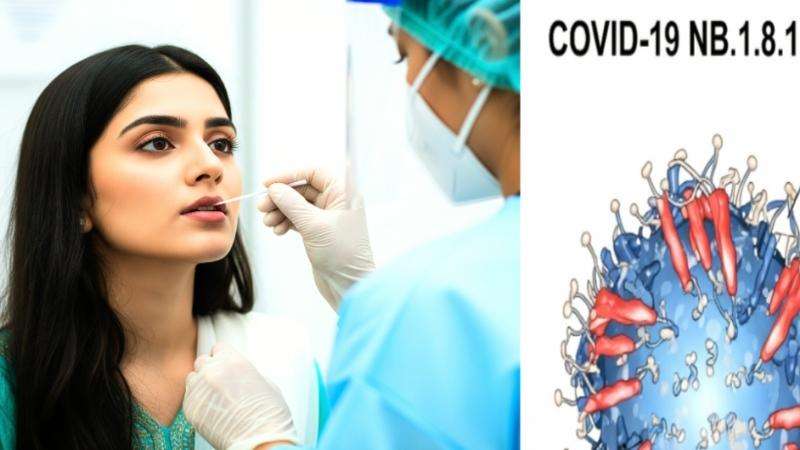A new COVID-19 variant, designated NB.1.8.1 and nicknamed "Nimbus," is causing a fresh wave of concern worldwide as it drives a notable surge in infections and hospital admissions. While comprehensive data is hampered by significantly reduced testing compared to the pandemic's peak, the variant's rapid spread is undeniable, prompting health authorities to closely monitor the situation, Daily Dazzling Dawn understands.
Global Spread and Rising Cases:
First detected in January of this year, NB.1.8.1 has quickly become a dominant strain. The World Health Organization (WHO) declared it a "variant under monitoring" on May 23rd, noting its global prevalence increased from just 2.5% of submitted sequences in March to 10.7% by late April. Its presence has been confirmed across China, Hong Kong, the United States, and Australia, with India and Bangladesh also reporting a significant uptick in cases.
Impact in the UK:
The UK Health Security Agency (UKHSA) confirmed 13 cases of the NB.1.8.1 variant in England in early June. More significantly, hospital admissions due to COVID-19 across the UK have seen a concerning rise of almost 10% in the week ending May 31st, with 947 patients admitted. This increase highlights the potential impact of the new variant on healthcare systems.
Situation in Europe:
While specific country-by-country data for NB.1.8.1 across Europe is still emerging due to varied testing strategies, the overall trend suggests an increase in COVID-19 activity. European health agencies are closely collaborating to track the variant's spread and assess its potential impact on public health. The ease of international travel contributes to the rapid dissemination of new variants across the continent.
Bangladesh on Alert:
Bangladesh is experiencing a surge in cases linked to NB.1.8.1, mirroring the trend observed in other Asian nations. Public health officials are urging vigilance and reinforcing preventative measures as the variant puts renewed pressure on the country's healthcare infrastructure.
What Makes NB.1.8.1 Different?
Originating from the Omicron lineage, NB.1.8.1 possesses "tweaks to its spike protein," according to Dr. Chun Tang, GP at UK private healthcare centre Pall Mall Medical. Virologist Lara Herrero from Griffith University in Australia suggests these modifications may enhance its transmissibility. "Using lab-based models, researchers found NB.1.8.1 had the strongest binding affinity to the human ACE2 receptor of several variants tested, suggesting it may infect cells more efficiently than earlier strains," Dr. Herrero wrote in The Conversation last month. This increased binding affinity could explain its rapid spread compared to other circulating variants.
Should You Get Vaccinated?
With the emergence of new variants like NB.1.8.1, the question of vaccination remains pertinent. While the news report doesn't explicitly state new vaccination guidelines for this specific variant, generally, health authorities recommend COVID-19 vaccination for individuals who are most vulnerable to severe illness. The NHS in the UK contacts eligible individuals to offer the COVID vaccine, typically those with health conditions, undergoing certain treatments, or residing in care homes for older adults. Staying up-to-date with booster shots when eligible remains a crucial step in mitigating the risk of severe disease, hospitalization, and death from COVID-19.
Distinguishing COVID-19 from Hay Fever Amidst High Pollen Counts:
Adding to the complexity of the current situation, the UK is experiencing high pollen counts, leading to widespread hay fever symptoms that can often be confused with COVID-19. Doctor Luke Powles, associate clinical director at Bupa, notes that while both can cause sniffs and sneezes, a key differentiator is the presence of a high temperature. The NHS defines a high temperature as feeling hot to touch on your chest or back, often accompanied by shivering, which is characteristic of COVID-19 but "not likely" with hay fever. Additionally, while a blocked nose from hay fever can affect smell or taste, a complete loss of these senses is more indicative of a COVID-19 infection.
As the NB.1.8.1 variant continues its global propagation, health agencies emphasize the importance of awareness, good hygiene practices, and considering vaccination, especially for vulnerable populations, to curb its impact. The ongoing challenge remains effectively tracking the variant's true reach given the decline in widespread testing.
The NHS advises that while there are no longer specific COVID-19 restrictions, individuals with symptoms and a high temperature, or those feeling too unwell for normal activities, should try to stay home and avoid contact with others.








.svg)



